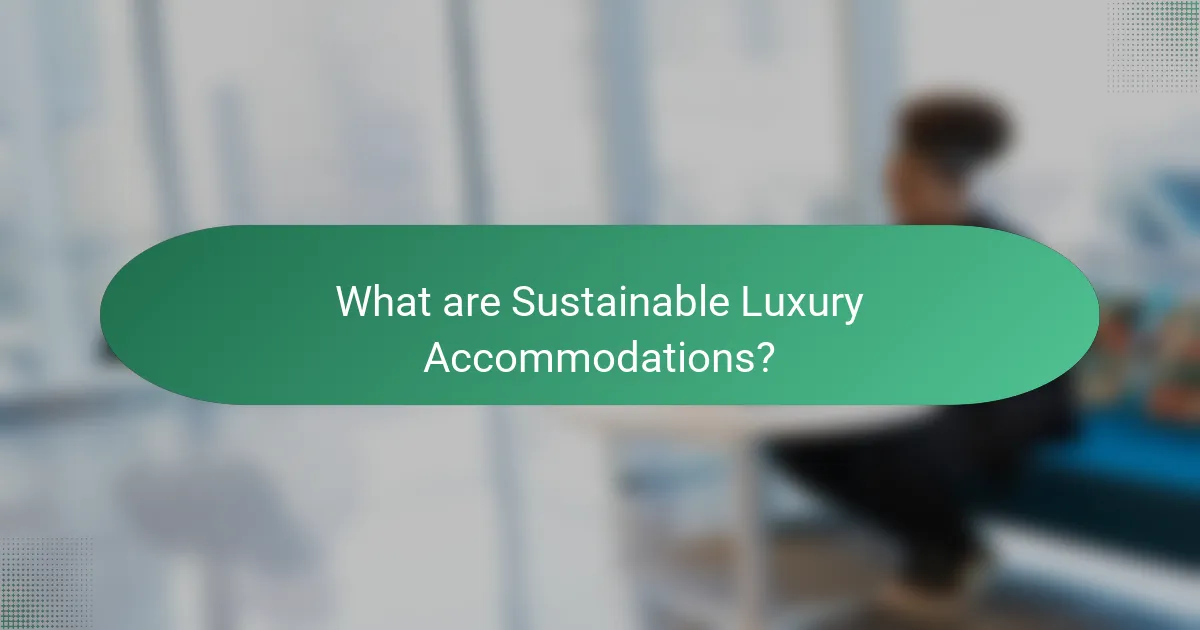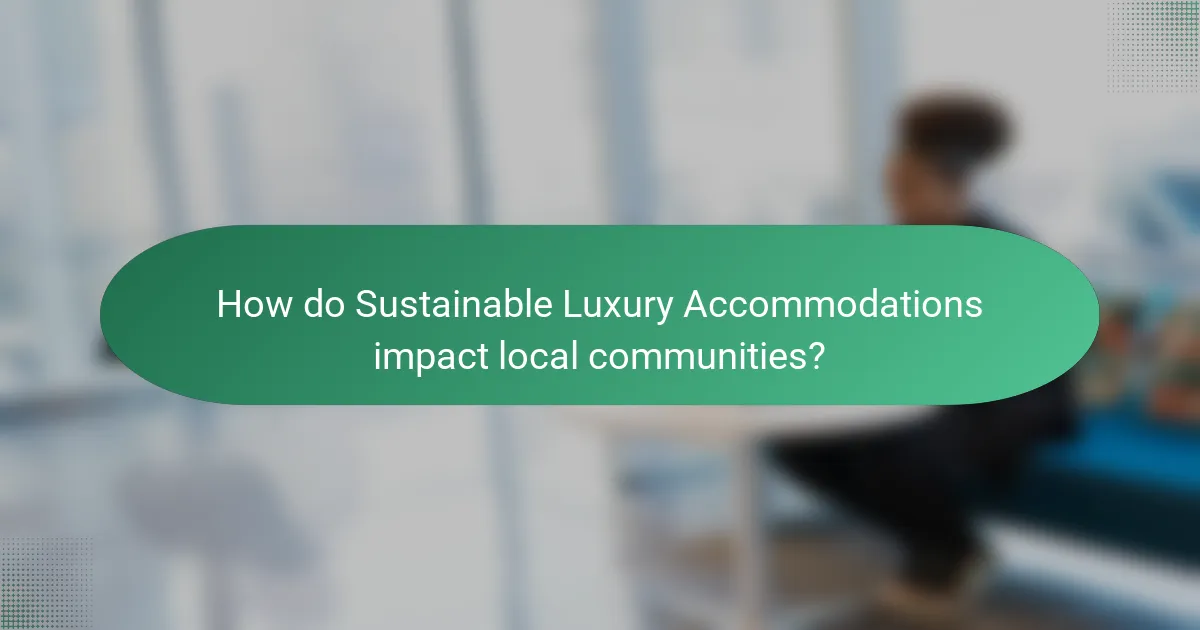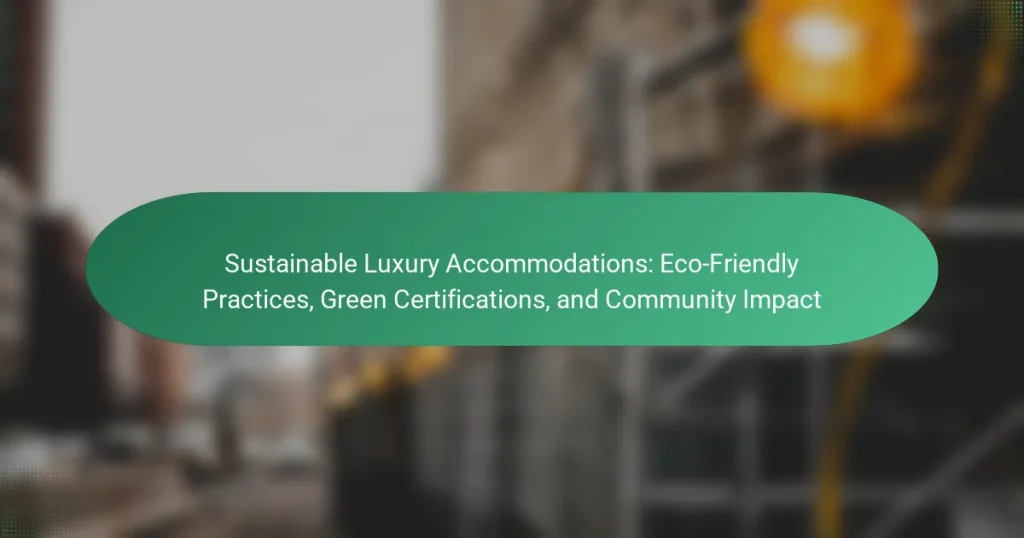Sustainable luxury accommodations are high-end lodging options that prioritize environmental responsibility through eco-friendly practices. These establishments utilize renewable energy sources, implement water conservation measures, and use sustainable materials in construction and furnishings. They engage in local community initiatives, supporting local economies and enhancing community well-being. Recognized certifications, such as LEED and Green Key, validate their sustainable practices. Future trends in this sector include increased adoption of renewable energy, sustainable food sourcing, and smart technology to improve energy efficiency, reflecting a commitment to sustainability in luxury hospitality.

What are Sustainable Luxury Accommodations?
Sustainable luxury accommodations are high-end lodging options that prioritize environmental responsibility. These establishments implement eco-friendly practices in their operations. They often use renewable energy sources, such as solar or wind power. Water conservation measures, like low-flow fixtures, are commonly employed. Sustainable materials are used in construction and furnishings. Many of these accommodations also engage in local community initiatives. They may source food from local farms or support local artisans. Certifications from recognized organizations validate their sustainable practices. Examples include LEED certification or Green Key certification.
How do Sustainable Luxury Accommodations differentiate from traditional luxury options?
Sustainable luxury accommodations differentiate from traditional luxury options by prioritizing eco-friendly practices. These accommodations often utilize renewable energy sources, such as solar or wind power. They implement water conservation techniques, like rainwater harvesting and low-flow fixtures. Sustainable luxury options also focus on sourcing local and organic food for their restaurants. This reduces carbon footprints associated with food transportation. Additionally, they frequently engage in community support initiatives, promoting local culture and economy. Traditional luxury options typically prioritize opulence and exclusivity without such environmental considerations. The rise in eco-conscious consumerism has led to a growing demand for sustainable luxury experiences.
What core principles define Sustainable Luxury Accommodations?
Sustainable luxury accommodations are defined by principles of environmental stewardship, social responsibility, and economic viability. These principles ensure that luxury experiences do not compromise ecological integrity. Environmental stewardship includes energy efficiency, water conservation, and waste reduction practices. Social responsibility encompasses fair labor practices and community engagement. Economic viability ensures that these accommodations remain profitable while supporting local economies. The integration of these principles leads to a holistic approach that enhances guest experience while minimizing the ecological footprint. Research indicates that 87% of travelers prefer eco-friendly hotels, highlighting the growing demand for sustainability in luxury tourism.
How do consumer preferences influence the growth of Sustainable Luxury Accommodations?
Consumer preferences significantly influence the growth of Sustainable Luxury Accommodations. Increasingly, travelers prioritize eco-friendly practices and sustainability in their lodging choices. A 2021 study by Booking.com found that 81% of global travelers feel strongly about staying in sustainable accommodations. This shift in consumer behavior drives luxury brands to adopt green certifications and eco-friendly initiatives. As a result, many luxury hotels implement renewable energy sources and sustainable sourcing of materials. Additionally, these accommodations often engage in community impact projects, enhancing their appeal to socially conscious consumers. The demand for transparency in sustainability practices further propels this growth. Ultimately, consumer preferences are reshaping the luxury hospitality landscape towards more sustainable options.
Why are Eco-Friendly Practices essential in Sustainable Luxury Accommodations?
Eco-friendly practices are essential in sustainable luxury accommodations because they reduce environmental impact. These practices help conserve resources and minimize waste. For instance, implementing energy-efficient systems can lower energy consumption by up to 30%. Water-saving technologies can reduce water usage significantly, often by 20-40%. Additionally, eco-friendly materials in construction and decor enhance sustainability. Certifications like LEED indicate adherence to environmental standards. Guests increasingly prefer accommodations that prioritize sustainability, influencing their choices. This shift in consumer preference drives the luxury market towards greener practices. Ultimately, eco-friendly practices align luxury with responsible tourism, creating a positive impact on communities and ecosystems.
What are the key eco-friendly practices adopted by these accommodations?
Key eco-friendly practices adopted by sustainable luxury accommodations include energy conservation, waste reduction, and water management. Many establishments implement solar panels to harness renewable energy. They often use energy-efficient lighting and appliances to minimize consumption. Waste reduction strategies include recycling programs and composting organic waste. Some accommodations offer digital check-in to reduce paper use. Water management practices involve low-flow fixtures and rainwater harvesting systems. Additionally, many promote local sourcing of food and materials to support community economies. These practices contribute to a smaller carbon footprint and promote environmental sustainability.
How do eco-friendly practices enhance guest experiences?
Eco-friendly practices enhance guest experiences by creating a healthier and more enjoyable environment. These practices often include the use of sustainable materials and energy-efficient systems. Guests appreciate the reduction in their carbon footprint during their stay. Eco-friendly accommodations frequently offer organic and locally sourced food options. This not only supports local economies but also provides fresher dining experiences. Additionally, such practices contribute to improved air and water quality. Research indicates that 70% of travelers prefer eco-friendly options. This preference leads to higher satisfaction and loyalty among guests. Overall, eco-friendly practices align with the values of environmentally conscious travelers.
What role do Green Certifications play in Sustainable Luxury Accommodations?
Green certifications validate the sustainability practices of luxury accommodations. They provide a framework for measuring environmental performance. These certifications often require adherence to specific standards in energy efficiency, water conservation, and waste management. Luxury accommodations with green certifications attract eco-conscious travelers. Research indicates that 70% of consumers prefer eco-friendly options when traveling. Certifications enhance brand reputation and build customer loyalty. They also encourage continuous improvement in sustainable practices. In summary, green certifications play a crucial role in promoting sustainability in luxury accommodations.
Which organizations provide Green Certifications for accommodations?
Organizations that provide Green Certifications for accommodations include the Green Key Eco-Rating Program, LEED (Leadership in Energy and Environmental Design), and EarthCheck. The Green Key Eco-Rating Program evaluates hotels based on their environmental practices. LEED certification is awarded to buildings meeting specific sustainability criteria. EarthCheck focuses on sustainable tourism practices, providing benchmarks for accommodations. These organizations assess energy efficiency, waste management, and water conservation. Their certifications promote eco-friendly practices within the hospitality industry.
What are the benefits of obtaining Green Certifications for hotels and resorts?
Obtaining Green Certifications for hotels and resorts provides numerous benefits. These certifications enhance a property’s reputation by showcasing commitment to sustainability. They attract eco-conscious travelers, increasing occupancy rates. Green certifications often lead to cost savings through energy efficiency and waste reduction. Certification can also improve employee morale by fostering a responsible work environment. Additionally, certified hotels may receive tax incentives or grants. Research shows that 87% of travelers prefer eco-friendly accommodations. This preference translates into higher revenue for certified establishments.

How do Sustainable Luxury Accommodations impact local communities?
Sustainable luxury accommodations positively impact local communities by promoting economic development and environmental conservation. They often source materials and services locally, which boosts the local economy. Employment opportunities are created through the hiring of local staff. These accommodations also invest in community projects, such as education and infrastructure improvements. By adopting eco-friendly practices, they help preserve local ecosystems. Studies show that sustainable tourism can increase community engagement and pride. For example, according to the Global Sustainable Tourism Council, sustainable practices enhance the quality of life for local residents.
What initiatives do these accommodations undertake to support local communities?
Sustainable luxury accommodations undertake various initiatives to support local communities. They often engage in partnerships with local artisans to promote cultural heritage. This helps preserve traditional crafts and provides income to local families. Many accommodations also source food and products from nearby farms. This supports local agriculture and reduces carbon footprints. Additionally, they may offer employment opportunities to residents, enhancing economic stability. Some establishments contribute to community projects, such as building schools or funding health programs. These actions foster goodwill and strengthen community ties. Overall, these initiatives create a positive impact on local economies and cultures.
How do Sustainable Luxury Accommodations foster local employment opportunities?
Sustainable luxury accommodations foster local employment opportunities by prioritizing local hiring practices. They often employ residents for various roles, from management to service positions. This approach supports the local economy and reduces unemployment rates. Many sustainable accommodations also collaborate with local artisans and businesses, creating additional job opportunities. For instance, they may source food from local farms or hire local guides for tours. This practice encourages skill development and training within the community. According to a study by the World Travel & Tourism Council, sustainable tourism can create jobs that are up to 20% more resilient than traditional tourism jobs. This resilience further strengthens local employment stability.
What are the environmental benefits of community engagement in these accommodations?
Community engagement in sustainable luxury accommodations fosters environmental benefits. It encourages local conservation efforts, leading to enhanced biodiversity. Engaged communities often participate in waste reduction initiatives, decreasing landfill contributions. Collaborative projects can promote renewable energy usage, lowering carbon footprints. Community members contribute local knowledge, improving sustainability practices. This engagement also raises awareness about environmental issues among residents and visitors. Research indicates that communities involved in eco-friendly practices see improved natural resource management. Overall, community engagement strengthens environmental stewardship in sustainable accommodations.
How can travelers choose Sustainable Luxury Accommodations effectively?
Travelers can choose sustainable luxury accommodations effectively by researching eco-friendly practices and green certifications. Look for hotels that have certifications like LEED or Green Key. These certifications indicate a commitment to sustainability. Evaluate the hotel’s energy use, water conservation, and waste management practices. Check if they source food locally and support community initiatives. Reading reviews can provide insights into their sustainability efforts. Additionally, consider the hotel’s impact on the local environment and community. Prioritize accommodations that engage in responsible tourism practices. This approach ensures a luxurious stay while supporting sustainability.
What criteria should travelers consider when selecting eco-friendly accommodations?
Travelers should consider sustainability practices, certifications, location, and community impact when selecting eco-friendly accommodations. Sustainable practices include energy efficiency, waste management, and water conservation measures. Certifications like LEED or Green Key validate an accommodation’s eco-friendly claims. The location should minimize travel-related carbon emissions. Community impact involves supporting local economies and employing local staff. These criteria help ensure a genuine commitment to sustainability rather than superficial marketing.
How can travelers verify the sustainability claims of luxury accommodations?
Travelers can verify the sustainability claims of luxury accommodations by checking for recognized green certifications. Certifications from organizations like LEED, Green Key, and EarthCheck indicate adherence to sustainability standards. Travelers should review the accommodation’s website for transparency in eco-friendly practices. Reading guest reviews can provide insights into actual sustainability efforts. Additionally, contacting the accommodation directly for detailed information on their sustainability initiatives can be helpful. Researching the property’s involvement in local conservation efforts can also validate their claims. Finally, comparing claims to independent assessments or reports enhances credibility.

What are the future trends in Sustainable Luxury Accommodations?
Future trends in sustainable luxury accommodations include increased use of renewable energy sources. Many establishments are adopting solar panels and wind energy to reduce carbon footprints. Water conservation practices are also becoming prevalent. Hotels are implementing rainwater harvesting and greywater recycling systems. Sustainable sourcing of food is another trend. Many luxury accommodations are partnering with local farms for organic produce. Eco-friendly materials are increasingly used in construction and interior design. Sustainable luxury brands are focusing on biodegradable and recycled materials. Digital solutions for guest experiences are on the rise. Smart technology is enhancing energy efficiency in accommodations. Finally, community engagement is gaining importance. Hotels are investing in local projects and supporting cultural heritage initiatives. These trends reflect a growing commitment to sustainability in the luxury hospitality sector.
How is technology influencing the sustainability efforts in luxury accommodations?
Technology is significantly enhancing sustainability efforts in luxury accommodations. Smart building technologies optimize energy consumption through automated systems. These systems control heating, lighting, and cooling based on occupancy. Energy-efficient appliances reduce resource usage and lower operational costs. Water-saving fixtures minimize waste while maintaining guest comfort. Renewable energy sources, like solar panels, are increasingly integrated into luxury resorts. These technologies contribute to reduced carbon footprints and lower environmental impact. Furthermore, digital platforms facilitate eco-friendly practices, such as paperless check-ins and online concierge services. This shift not only streamlines operations but also promotes sustainable behaviors among guests.
What innovations are emerging in eco-friendly practices within the luxury sector?
Emerging innovations in eco-friendly practices within the luxury sector include sustainable materials, energy-efficient technologies, and waste reduction strategies. Luxury brands are increasingly utilizing biodegradable and recycled materials in their products. For instance, some fashion houses are adopting organic cotton and vegan leather alternatives. Energy-efficient technologies such as solar panels and smart building systems are being integrated into luxury accommodations. These technologies reduce carbon footprints and enhance guest experiences. Additionally, many luxury hotels are implementing zero-waste programs, aiming to minimize landfill contributions. Brands are also focusing on sustainable sourcing, ensuring that ingredients and materials are ethically sourced. These innovations reflect a growing commitment to environmental stewardship in the luxury sector.
What are some best practices for implementing sustainability in luxury accommodations?
Implementing sustainability in luxury accommodations involves several best practices. Firstly, adopting energy-efficient technologies reduces operational costs and carbon footprints. For instance, LED lighting and smart thermostats can significantly decrease energy consumption. Secondly, sourcing local and organic food supports local economies and reduces transportation emissions. Research indicates that local sourcing can cut food miles by up to 90%. Thirdly, integrating water conservation measures, such as low-flow fixtures and rainwater harvesting, helps minimize water usage. Studies show that hotels can save up to 30% in water costs with these practices. Additionally, obtaining green certifications, like LEED or Green Key, validates sustainability efforts and attracts eco-conscious travelers. Lastly, engaging with the local community through partnerships and initiatives enhances social responsibility and fosters goodwill. These practices collectively promote a sustainable model for luxury accommodations while appealing to environmentally aware guests.
How can accommodations measure the success of their sustainability initiatives?
Accommodations can measure the success of their sustainability initiatives through various metrics. These metrics include energy consumption reductions, water usage efficiency, and waste management improvements. Tracking energy usage before and after implementing sustainability practices provides concrete data. For example, accommodations that adopt LED lighting often see a reduction in energy costs by up to 75%. Water-saving fixtures can lead to a decrease in water usage by 30% or more.
Additionally, guest feedback can serve as a qualitative measure of sustainability success. Surveys can gauge guest satisfaction with eco-friendly practices. Certifications from recognized organizations, such as LEED or Green Key, can validate sustainability efforts. These certifications often require accommodations to meet specific environmental standards.
Furthermore, monitoring community engagement and local sourcing can indicate the broader impact of sustainability initiatives. Accommodations that support local businesses and reduce carbon footprints demonstrate commitment to sustainable tourism. Overall, a combination of quantitative data and qualitative feedback provides a comprehensive assessment of sustainability success.
What common challenges do luxury accommodations face in becoming sustainable?
Luxury accommodations face several common challenges in becoming sustainable. High operational costs often hinder investment in eco-friendly technologies. Many luxury hotels prioritize guest experience, which can conflict with sustainability efforts. Limited access to sustainable suppliers complicates the sourcing of eco-friendly materials. Staff training on sustainability practices is frequently inadequate. Regulatory compliance can be complex and varies by location. Additionally, luxury brands may struggle with consumer perception regarding sustainability versus traditional luxury. These challenges create significant barriers to implementing sustainable practices effectively.
Sustainable luxury accommodations are high-end lodging options that prioritize environmental responsibility through eco-friendly practices. This article explores the differentiation between sustainable and traditional luxury accommodations, highlighting core principles such as environmental stewardship and social responsibility. It examines the influence of consumer preferences on the growth of sustainable options, the significance of green certifications, and the positive impact on local communities. Key eco-friendly practices, technological innovations, and best practices for implementing sustainability in luxury accommodations are also discussed, along with the challenges faced in this transition.



